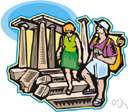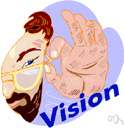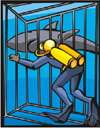sight
sight
sight
(sīt)sight
(saɪt)sight
(saɪt)n.
sight
- A measurement or observation taken with an optical device.Sight
a great number; a quantity; a sum; a multitude.scene
– sight – view – landscape – sceneryThe noun scene has several meanings.
It can refer to a part of a play, film, or novel.
The scene of an accident or crime is the place where it happened.
You can describe something as a scene of a particular kind when you are giving your impression of the things that are happening there at a particular time.
You use sight to give your impression of the appearance of a particular thing or person.
You can use the plural form sights to refer to the interesting things that there are to see in a particular place.
There are some other nouns that are commonly used to refer to things that people see:
View is used to refer to what you can see from a window or high place.
The landscape is what you can see around you when you are travelling through an area of land. You can use this word whether the area is attractive or not.
Scenery refers to what you see around you in an attractive part of the countryside.
Be Careful!
Scenery is an uncountable noun. Don't talk about 'sceneries' or 'a scenery'.
sight
Past participle: sighted
Gerund: sighting
| Imperative |
|---|
| sight |
| sight |
| Noun | 1. |  sight - an instance of visual perception; "the sight of his wife brought him back to reality"; "the train was an unexpected sight" sight - an instance of visual perception; "the sight of his wife brought him back to reality"; "the train was an unexpected sight"visual percept, visual image - a percept that arises from the eyes; an image in the visual system |
| 2. | sight - anything that is seen; "he was a familiar sight on the television"; "they went to Paris to see the sights" display - exhibiting openly in public view; "a display of courage" spectacle - something or someone seen (especially a notable or unusual sight); "the tragic spectacle of cripples trying to escape" | |
| 3. |  sight - the ability to see; the visual faculty sight - the ability to see; the visual facultyvisual system - the sensory system for vision exteroception - sensitivity to stimuli originating outside of the body stigmatism - normal eyesight achromatic vision - vision using the rods acuity, sharp-sightedness, visual acuity - sharpness of vision; the visual ability to resolve fine detail (usually measured by a Snellen chart) binocular vision - vision involving the use of both eyes central vision - vision using the fovea and parafovea; the middle part of the visual field distance vision - vision for objects that a 20 feet or more from the viewer monocular vision - vision with only one eye near vision - vision for objects 2 feet or closer to the viewer night vision, night-sight, scotopic vision, twilight vision - the ability to see in reduced illumination (as in moonlight) daylight vision, photopic vision - normal vision in daylight; vision with sufficient illumination that the cones are active and hue is perceived peripheral vision - vision at the edges of the visual field using only the periphery of the retina | |
| 4. | sight - a range of mental vision; "in his sight she could do no wrong" perspective, view, position - a way of regarding situations or topics etc.; "consider what follows from the positivist view" | |
| 5. | sight - the range of vision; "out of sight of land" | |
| 6. |  sight - the act of looking or seeing or observing; "he tried to get a better view of it"; "his survey of the battlefield was limited" sight - the act of looking or seeing or observing; "he tried to get a better view of it"; "his survey of the battlefield was limited"looking, looking at, look - the act of directing the eyes toward something and perceiving it visually; "he went out to have a look"; "his look was fixed on her eyes"; "he gave it a good looking at"; "his camera does his looking for him" eyeful - a full view; a good look; "they wanted to see violence and they got an eyeful" | |
| 7. |  sight - (often followed by `of') a large number or amount or extent; "a batch of letters"; "a deal of trouble"; "a lot of money"; "he made a mint on the stock market"; "see the rest of the winners in our huge passel of photos"; "it must have cost plenty"; "a slew of journalists"; "a wad of money" sight - (often followed by `of') a large number or amount or extent; "a batch of letters"; "a deal of trouble"; "a lot of money"; "he made a mint on the stock market"; "see the rest of the winners in our huge passel of photos"; "it must have cost plenty"; "a slew of journalists"; "a wad of money"good deal, great deal, hatful, lot, muckle, passel, peck, mickle, mint, quite a little, slew, spate, tidy sum, wad, stack, raft, mountain, pile, plenty, mass, batch, heap, deal, flock, pot, mess large indefinite amount, large indefinite quantity - an indefinite quantity that is above the average in size or magnitude deluge, flood, inundation, torrent - an overwhelming number or amount; "a flood of requests"; "a torrent of abuse" haymow - a mass of hay piled up in a barn for preservation | |
| Verb | 1. | sight - catch sight of; to perceive with the eyes; "he caught sight of the king's men coming over the ridge" perceive, comprehend - to become aware of through the senses; "I could perceive the ship coming over the horizon" |
| 2. | sight - take aim by looking through the sights of a gun (or other device) |
sight
"Out of sight, out of mind"
sight
nounsight
[saɪt]to have good sight → tener buena vista
I'm losing my sight → estoy perdiendo la vista
to have poor sight → tener mala vista
to regain one's sight → recobrar la vista
I can't bear the sight of blood → no aguanto la vista de la sangre
I can't stand the sight of him → no le puedo ver
at sight → a la vista
at first sight → a primera vista
it was love at first sight → fue un flechazo
I know her by sight → la conozco de vista
it came into sight → apareció
to catch sight of sth/sb → divisar algo/a algn
to be in sight → estar a la vista (of de) to keep sth in sight → no perder de vista algo
our goal is in sight → ya vemos la meta
we are in sight of victory → estamos a las puertas de la victoria
to find favour in sb's sight [plan etc] → ser aceptable a algn; [person] → merecerse la aprobación de algn
to lose sight of sth/sb → perder algo/a algn de vista
to lose sight of sb (fig) → perder contacto con algn
to lose sight of the fact that → no tener presente el hecho de que ...
to be lost to sight → desaparecer, perderse de vista
to shoot on sight → disparar sin previo aviso
to be out of sight → no estar a la vista
keep out of sight! → ¡que no te vean!
not to let sb out of one's sight → no perder a algn de vista
to drop out of sight → desaparecer
out of sight (US) → fabuloso
to buy sth sight unseen → comprar algo sin verlo
to be within sight → estar a la vista (of de) to have sth within sight → tener algo a la vista
we were within sight of the coast → teníamos la costa a la vista
out of sight, out of mind → ojos que no ven, corazón que no siente
it was an amazing sight → era un espectáculo asombroso
his face was a sight! → ¡había que ver su cara!; (after injury etc) → ¡había que ver el estado en que quedaba su cara!
I must look a sight → debo parecer horroroso, ¿no?
doesn't she look a sight in that hat! → ¡con ese sombrero parece un espantajo!
what a sight you are! → ¡qué adefesio!
the sights → los lugares de interés turístico
to see or visit the sights of Madrid → visitar los lugares de interés turístico de Madrid, hacer turismo por Madrid
it's not a pretty sight → no es precisamente bonito
it's a sad sight → es una cosa triste
it's a sight for sore eyes → da gusto verlo
in one's sights → en la línea de tiro
to lower one's sights → renunciar a algunas de sus aspiraciones
to raise one's sights → volverse más ambicioso, apuntar más alto
to set one's sights on sth/doing sth → aspirar a or ambicionar algo/hacer algo
to set one's sights too high → ser demasiado ambicioso
sight
[ˈsaɪt]She has poor sight → Elle a une mauvaise vue.
Her sight is failing → Sa vue baisse.
at the sight of sth → à la vue de qch
I faint at the sight of blood → Je m'évanouis à la vue du sang.
to know sb by sight → connaître qn de vue
I know her by sight → Je la connais de vue.
to catch sight of sb/sth → apercevoir qn/qch
on sight [shoot] → à vue
They were told to shoot on sight → On leur a dit de tirer à vue.
at first sight → à première vue, au premier abord
love at first sight → le coup de foudre
at sight (COMMERCE) → à vue
to be in sight (= visible) → être en vue
There was no one in sight → Il n'y avait personne en vue.
There wasn't a policeman in sight → Il n'y avait pas un policier en vue.
to be in sight (= likely to happen) → être en vue
The end is in sight → La fin est en vue.
to be out of sight → être hors de vue
out of sight, out of mind → loin des yeux, loin du cœur
She has been sighted in the Birmingham area → Elle a été aperçue dans la région de Birmingham.
to see the sights of London → visiter Londres
sight
sight
:sight
[saɪt]to have good/poor (eye)sight → avere la vista buona/cattiva
at first sight → a prima vista
I know her by sight → la conosco di vista
payable at sight (Comm) → pagabile a vista
to be within sight of (sea) → essere in vista di (victory) → essere vicino/a a
the bus was still in sight → l'autobus si vedeva ancora
the end is in sight → si intravvede la fine
a solution is in sight → è in vista una soluzione
to come into sight (thing) → profilarsi all'orizzonte
Janice came into sight → abbiamo scorto Janice
to catch sight of sth/sb → scorgere qc/qn
keep out of my sight! → sparisci!
don't let it out of your sight → non perderlo di vista
when it's out of sight → quando non si vede più, quando non è più visibile
out of sight out of mind (Proverb) → lontano dagli occhi lontano dal cuore
to lose sight of sb/sth → perdere di vista qn/qc
to hate the sight of sb/sth → non sopportare la vista di qn/qc
to see the sights of Rome → vedere or visitare i monumenti di Roma
it's not a pretty sight → non è uno spettacolo edificante
you're a sight for sore eyes! → al solo vederti mi si allarga il cuore!
you look a sight! (fam) → come sei conciato!
it's a sight to be seen → è uno spettacolo da non perdere